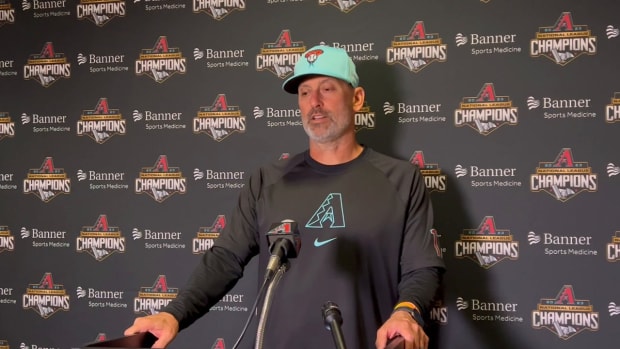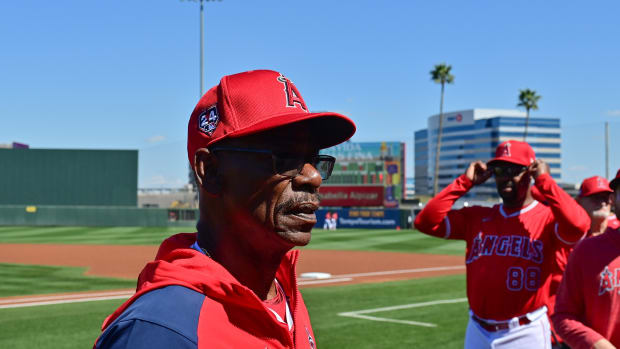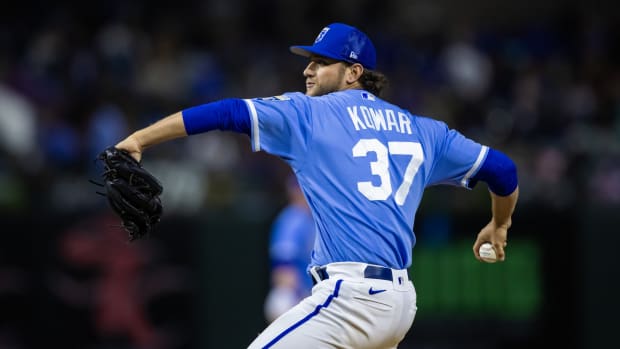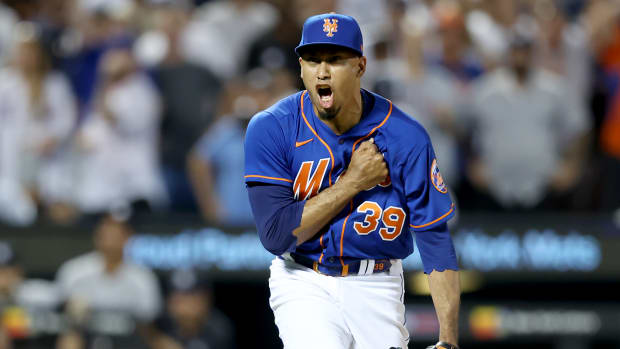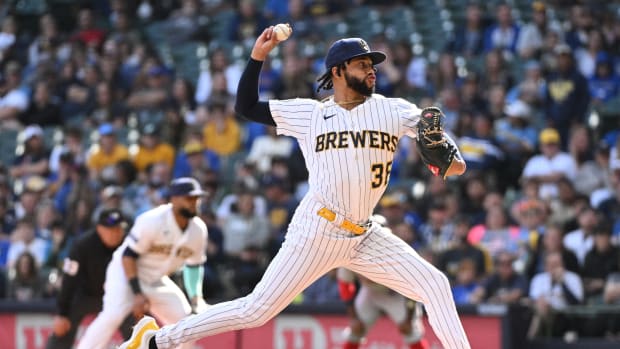An Oral History of Barry Bonds's Intentional Walk With the Bases Loaded
The first three hours and 20 minutes of the May 28, 1998 game between the Giants and Diamondbacks were interesting only because Arizona was winning. The Diamondbacks were two months into their existence as an expansion team and had a record of 16–36. Still, 12,066 people showed up to Candlestick Park in San Francisco, with thousands more tuning in from home. Every time you watch a baseball game, old-timers like to say, you have a chance to see something you’ve never seen before.
On May 28, 1998, anyone watching that baseball game saw something no one had seen before.
Buck Showalter, Diamondbacks manager: The bottom line is, you’re always trying to give your team a chance to win the game.
Brian Anderson, Diamondbacks starting pitcher: Going into the bottom of the seventh, we were up 7–2, so things seemed to be pretty well in hand. I went 6 1/3 and gave up a home run, so we’re up 7–3, and you’re still feeling pretty good about things. I headed into the clubhouse after the inning and started to ice down. Then things started to get weird.
Gregg Olson, Diamondbacks reliever: Bonds wasn’t playing that day, so he pinch hit in the eighth, not in his normal spot in the order. I came in to face him. I fell behind. I got to a 3–1 count, threw a curveball to get to 3–2 and then threw what I thought was a perfect fastball down and away. The home plate umpire didn’t agree with me. He called it ball four. During that time period, [Bonds] had a way of showing people up. I thought it was strike three and probably would be against 99% of Major League Baseball, and he just stood in the box and peeled off the ankle cover and the thing he had on his right arm, and I felt like he just walked down to first base. I don’t think he jogged at all.
Olson walked Brent Mayne, loading the bases, then struck out shortstop Rey Sánchez for the third out of the eighth. Diamondbacks left fielder David Dellucci hit a solo home run in the top of the ninth to extend Arizona's lead to 8–5. Olson opened the ninth by striking out Giants center fielder Darryl Hamilton.
Olson: It sounds like an excuse, but I don’t usually walk that many people. It started to rain. My back foot, my plant foot, started slipping a little bit. I made a complete mess out of the ninth inning.
Mike Krukow, Giants broadcaster: They were behind and here we are, ninth inning at home, they start to put together a little attack. Right away you start looking: When is Bonds gonna come up?
Showalter: Normally he would have had Jeff Kent hitting behind him. As the inning unfolded, all you’re looking for is a way to keep Barry from hurting you.
Carlos Tosca, Diamondbacks bench coach: I was thinking the same thing I’m sure everybody else was thinking: You were just hoping against hope that something would happen before he came up to the plate.
Giants third baseman Bill Mueller walked on four pitches. Second baseman Jeff Kent doubled. First baseman Charlie Hayes walked. Right fielder Stan Javier grounded to second, scoring Mueller. San Francisco trailed 8–6 with two outs in the the ninth.
Anderson: Olson’s command was not where he wanted it to be. Things are starting to spiral out of control. J.T. Snow pinch hit, and Olson ends up walking him for his fifth walk. And who’s coming to the plate now, with the bases juiced?
Ron Wotus, Giants third base coach: We’re going, We have ’em right where we want ’em: Here comes Bonds.
Krukow: The Diamondbacks have a two-run lead with the bases loaded and here comes Bonds. We’re thinking, They have to pitch to him, right?
Kelly Stinnett, Diamondbacks catcher: You just always wanted to bust him in. Don’t let him get his arms extended. He had such a compact swing, and anything over the plate he just crushed. He was a really good off-speed hitter. You wanted to pound him in. If you hit him, so what? He’s got the big elbow guard on. Give him first base. He wasn’t a true base-stealing threat. Just don’t let him beat you.
Olson: I felt like he had come off my fastball in [the eighth] and I could get a fastball down and away. The next at bat it probably would’ve been more of the same thing. I probably would’ve started soft and then tried to finish him with a fastball when he wasn’t expecting it.
Showalter: He had unbelievable numbers against Olson. Olson was fastball-changeup at that point, mostly guile. It was a typical Candlestick Park night—rainy, windy, cold. Poor Gregg was sliding around out there. Nobody else was left in our bullpen. We couldn’t go extra innings.
Olson: I was in the 40s, pitch-count-wise. I was on fumes. I was done. That was 25 pitches more than I usually threw in an inning. I was done for three days after that, I was so stiff and sore.
Anderson: Candlestick was a tough place to play. The low clouds you could reach up and touch, the metal bleachers. It was always cold and windy. Everything felt damp all the time. You’re so close to the water. There’s so much condensation. We played a number of sloppy games in that ballpark.
Showalter: [I made the decision.] It’s not something you run by somebody and put them on the spot.
Tosca: That was Buck on his own. He didn’t have any conversation with me. [I didn’t realize what was happening] until he put the four fingers up. When I saw what we were doing, I thought, O.K., at least we know where he’s gonna be.
Anderson: I was more shocked than anything about how decisive Buck was. As soon as J.T. Snow walks, Showalter is already on the top step of the dugout, wiggling four fingers at Kelly Stinnett. That thought never entered my mind, which is why I’m not a manager.
Stinnett: I’m trying to figure out how to get Barry out with Gregg Olson. I think they had trouble getting my attention. [Third base coach Brian] Butterfield’s got that whistle. He got my attention. I finally looked in the dugout and Buck gave me the sign: four fingers up. I put mine up like, Uh, bases are loaded. He gave it to me really hard. I looked back again. I gave it, like, a triple take.
Showalter: Poor Kelly Stinnett. I put up four. He looked at third, looked at first, looked back at me.
Brent Brede, Diamondbacks right fielder: The thing I remember most is I could see how Barry Bonds stood up straight. He actually looked toward the dugout. For as great a player he was, he looked toward Buck. He couldn’t believe what was happening.
Krukow: He was trying to look at Showalter and make it a personal thing between him and Showalter, but Showalter was not buying that. Bonds would do that: Let me hit!
Showalter: I gave him a wink.
Stinnett: I put four fingers up to [Olson]. He gave me the double take. I pointed to the dugout, like, It’s not coming from me! Don’t get pissed off at me!
Olson: Everybody’s always like, “What did you think when Buck put the four fingers up?” I was so tired that I was just going, All right, whatever. But I look on deck, and Bonds is one of the greatest hitters ever, but I go, I don’t get Brent Mayne out that well either!
Showalter: It had nothing to do with Brent Mayne. I can’t explain to people what level Barry was compared to everybody else. It felt like every time up, he was gonna walk or hit a home run. If I wanted to end the game for sure, I would’ve let Barry hit.
Brede: I didn’t really get what was going on until [Stinnett] put his arm out.
Showalter: When something like that is going on, you are on an island. I looked around the dugout and there wasn’t anybody within 10 feet of me. That would’ve been a nice camera angle.
Anderson: He has to get Brent Mayne. There’s no margin for error. You have a pitcher who has walked six guys. The good news is, Gregg Olson was unflappable.
Bonds took first. Since the intentional walk became a statistic in 1955, no hitter had been intentionally walked with the bases loaded. Kent scored. The Giants still trailed, 8–7, with two outs in the ninth.
Brent Mayne, Giants catcher: As a player, it was more like, O.K., I’m gonna win the game. They were walking somebody to get to me and now I’m gonna get it done. I didn’t think, Oh my gosh, they’re walking in a run. That didn’t cross my mind. I mean, I knew what was going on when it was going on, but in the moment, I’m just trying to get the job done.
Olson: I was trying to get a strikeout, so I got ahead with a couple curveballs and a changeup. He fouled off, like, five pitches. I found myself at 3–2. That was the time where you go, Here it is, ’cause I’m not walking you. I just threw my little two-seam fastball, middle of the plate, and was hoping he’d hit it at somebody.
Krukow: He had a great at bat. He hit an absolute bullet.
Wotus: When the ball left his bat, I was ready to jump up and down.
Brede: It all happened pretty fast. He hit the ball really hard. It was not necessarily a difficult ball to catch, but at Candlestick at the time, the lights were in a position that made it difficult. I lost the ball for a brief moment and then it came out of the lights.
Showalter: As that ball was going over the infield, I’m going, O.K. Then I see [Brede], and he looks like somebody who just got knocked out in a prize fight—his legs are starting to wobble. You’ve always gotta make a decision when the ball goes in the light. If the ball goes in the light and stays in the light, you gotta make a decision: Am I gonna bail or stay here and hope it comes out of the light but take the risk of getting hit in the mouth? Thank goodness he didn’t bail.
Anderson: Brede caught it with one knee on the ground. You could hear my sigh of relief from on the field.
Mayne: I’ve lined out a lot of times before, so I wasn’t totally sure, but I knew I hit it good. I was pretty frustrated that it didn’t happen and we didn’t win.
Krukow: If there was ever justice in the world of baseball, Mayne should have had a hit to win the game, because he really had a great at bat.
Brede: I was so grateful to catch it. You could feel the magnitude of that moment. I was running in and I thought, Man, had I not caught that ball I might be in [Triple A] Tucson in 24 hours. Had I dropped that ball it would have been a bad reflection on [Showalter] and Gregg. We saved the win, and I saved some embarrassment.
Olson: The look on his face afterwards and then the look that he gives me walking through the handshake line! I just told him, “Thanks for scaring the crap out of me.”
Brede: I was good friends with Gregg Olson; we were cribbage buddies. My first thought was I felt bad for Gregg, because he was put in a position that he couldn’t challenge him.
Showalter: The only thing he was mad about was, “He didn’t let me hit him! If he’d just let me have some input, I would’ve hit him. I wasn’t throwing hard enough to hurt him anyway.” I let him have that emotion.
Olson: I jokingly say it would’ve been a perfect time to hit Barry for showing me up.
Showalter: At Candlestick, the visiting clubhouse was in the right field corner. You had to walk across the field. ... It’s all over, and I’ve gotta walk up there. Brian Anderson is the starting pitcher and he comes out. He’d had a couple cervezas watching the last few innings. He’s in his underwear and a T-shirt, jockstrap, shower shoes. He says, “Big old elephant testicles! Are you kidding me? That was my ‘W’ you were messing around with!” I said, “Did you get it?”
Anderson: That is exactly what I said to him.
Olson: I walk down the right field line and Willie Blair, one of our pitchers, is standing there with two beers in his hand in his underwear and a T-shirt. It wasn’t his day to pitch, so he was watching it in the clubhouse like a fan. He just hands me one of the beers and he says, “Damn, you’re fun to watch.”
Showalter: There were these two old ball guys there. They had to be plus-60. They’d sit down the foul line. These guys had seen every Giant game for probably the last 10 years. After the game, one of them said, “Buck, that was the greatest s--- I’ve ever seen. That was beautiful.”
Stinnett: We all had a nice little giggle about it. “This is gonna make SportsCenter!”
Mayne: After the game there were eight million reporters. This is the biggest thing I remember about the whole thing: There was one reporter who wasn’t even there after the game and wrote this big thing that I was pissed off that Buck did that to me, that I felt slighted. That wasn’t the case at all! I don’t blame him. And shoot, it worked. I aired [the reporter] out. And I talked to Buck and told him it was fine.
Showalter: He came to me and said, “Yeah, do it again—I’ll hit another rocket.” And he’s right! I just picked my poison.
The Giants won 89 games and ended the season 9 1/2 back of the first-place Padres. (They were also a game out of the wild card, but the Cubs held the tiebreaker.) The Diamondbacks finished in last place, at 65–97. That May 28 game was essentially meaningless. But it lived—and lives—on for the people who saw it. Two decades on, Stinnett still hears about it from friends. Showalter and Olson wish one another a happy anniversary every year. Then Rays manager Joe Maddon deployed the move in 2008, against Rangers slugging centerfielder Josh Hamilton. It worked then, too.
Showalter: We live in a world that is so result-oriented: If it works, it was right. Regardless of what happened, that was the best chance for us to win that night. I was at peace, whatever turned out.
Anderson: You gotta remember, too, this is an expansion team and this is within the first couple months of the season, so we hadn’t been together long. It’s not like there was a core group of players. We were all new. We’d been together for spring training, where you’re basically wearing name tags, and two months of the season, and we’re looking at each other like, What have we gotten ourselves into? Our manager is willing to do anything.
Showalter: Years later, ever since that day, Barry would come across the field and give me a bear hug and shoot the s---. Have you talked to him? I would love to—maybe that’s a Zoom special.
Bonds did not respond to a request to be interviewed for this story.
Bonds, at the time: Buck made history. Let him discuss it.
Showalter: There’s always a base open. That night, it was home plate.
































